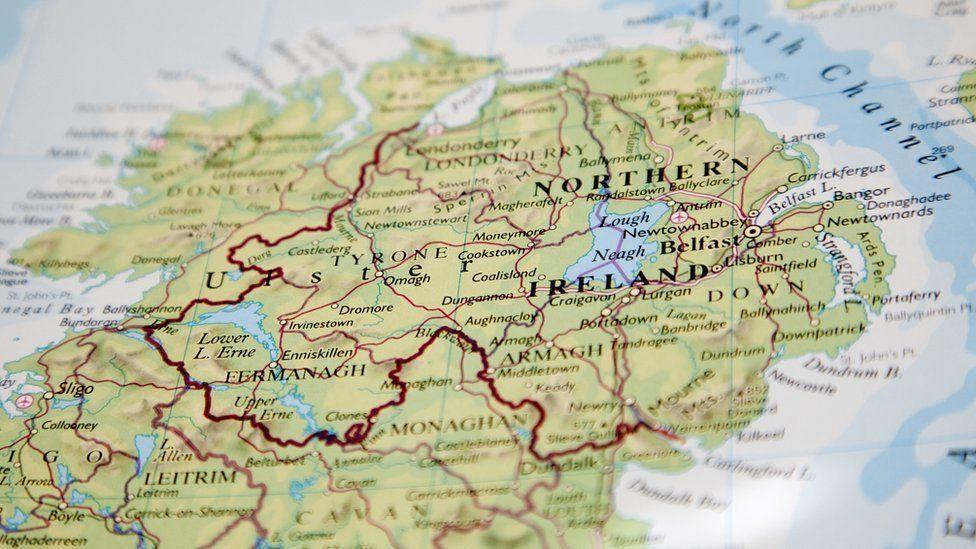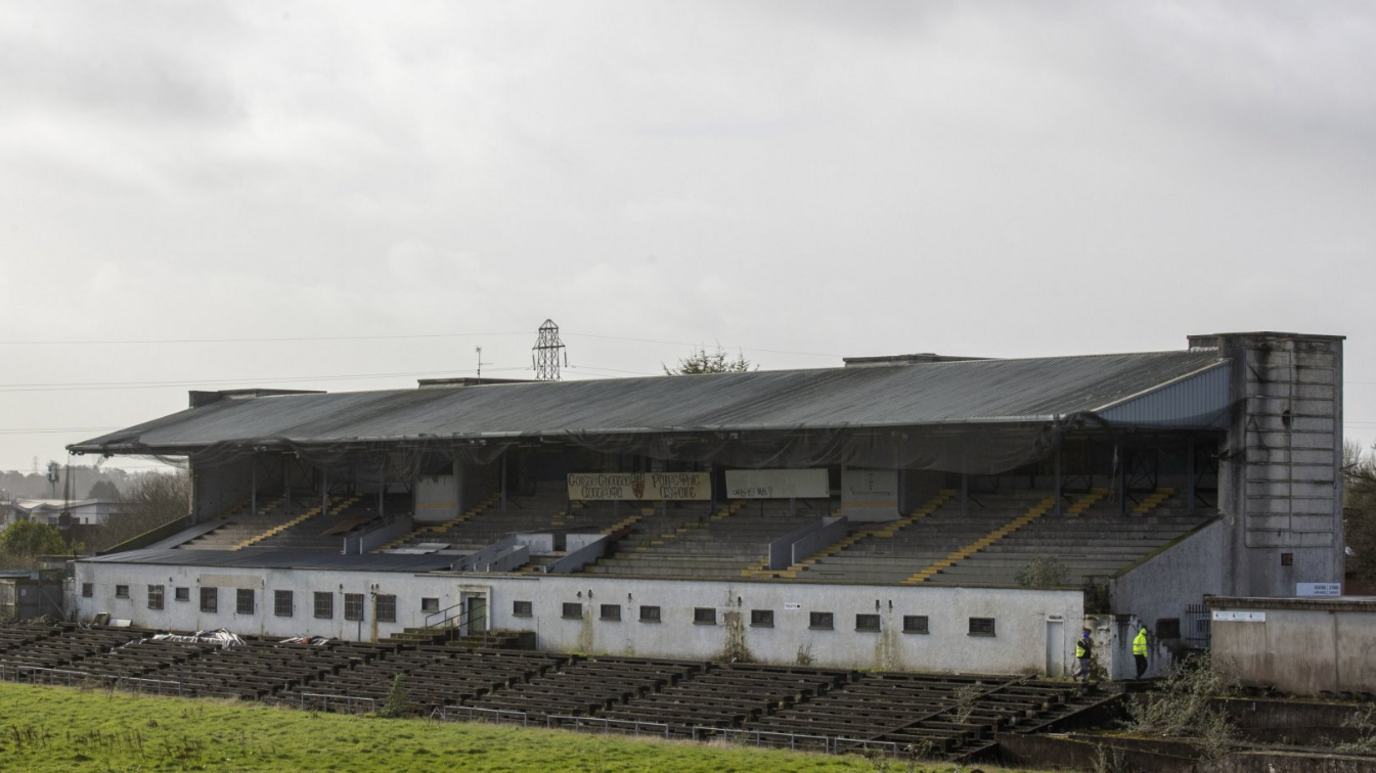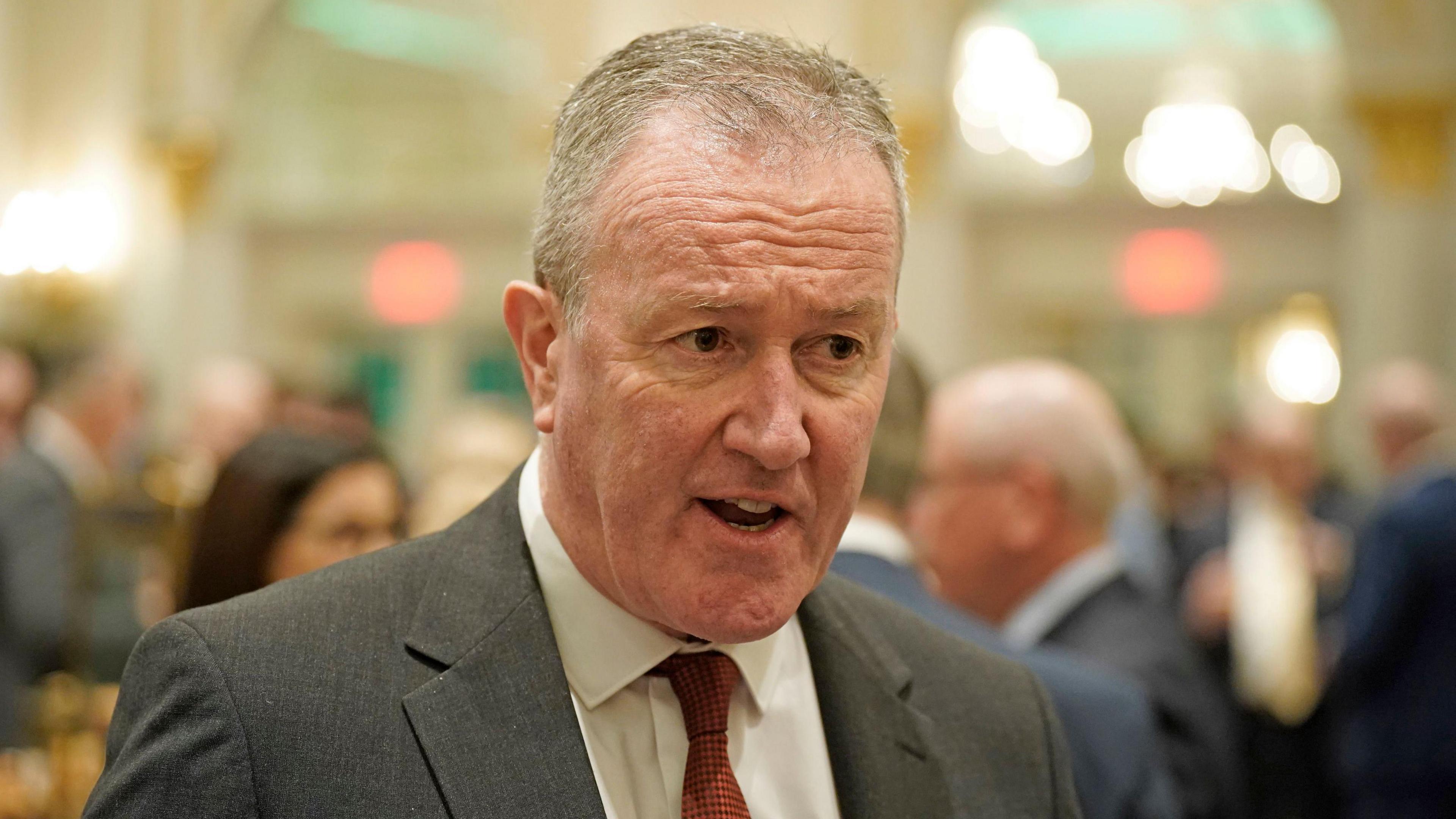Sinn Féin manifesto: Key policies analysed

Mary Lou McDonald is the president of Sinn Féin
- Published
Sinn Féin has launched its 2024 election manifesto, setting out the party's plans going forward.
The Irish republican party has previously said it will not run candidates in four Northern Ireland constituencies in the UK general election.
Sinn Féin will not contest Belfast East, Belfast South and Mid Down, Lagan Valley and North Down.
The Northern Ireland Assembly is the devolved administration but is known locally as Stormont, after its location in east Belfast.
Westminster also has control over issues which affect the UK as a whole, known as reserved or excepted matters.
Stormont is responsible for a range of issues which mainly cover every day life within Northern Ireland, including agriculture, education, the economy, finance, health and infrastructure.
Here are some of Sinn Féin's key policies, analysed by BBC Northern Ireland correspondents.
No desired timeframe for border poll in document

The party has called on several Conservative secretaries of state to spell out the criteria for holding a border poll, but each time the UK government has resisted
Constitutional change is a key component of what makes Sinn Féin tick.
But as for when that should happen, the party has not attached a desired timeframe for any border poll on the island of Ireland in this document.
The party president Mary Lou McDonald previously predicted such a referendum would be held before 2030.
But unfortunately for Sinn Féin, the timing remains in the hands of the Westminster government, specifically the Northern Ireland secretary.
The party has called on several Conservative secretaries of state to spell out the criteria for holding a border poll, but each time the UK government has resisted.
Under a Labour-led administration, this would appear unlikely to change any time soon.
Its leader, Keir Starmer, said last year it was "not even on the horizon".
So it is probably no surprise that Sinn Féin, which will also contest a general election in the Republic of Ireland in the coming months, also uses this manifesto to press the Irish government to ramp up its own planning around a potential border poll.
Transfer of fiscal powers from Westminster to Stormont

This promise will come as no surprise as back in 2022, the then Sinn Féin finance minister Conor Murphy launched a public consultation on the possible devolution of taxation powers.
He appointed an independent Fiscal Commission, which concluded income tax would be the most effective form of economic devolution.
However, it warned there are "important considerations" about the political and administrative capacity for Stormont to take on new responsibilities.
It added the experience of Scotland and Wales showed this capacity could be developed over time so "it is not a reason in itself to not consider devolution".
Income tax has been partially devolved in Scotland since 2016.
Since 2019, the Welsh government has also been able to vary rates of income tax.
The commission says that, drawing on the Welsh and Scottish experience, it should be possible "to realise significant increased fiscal devolution to Northern Ireland" by 2027/28.
While devolving tax powers presents opportunities, it also presents risks.
Collecting taxes locally would mean a corresponding cut in the block grant - the funding provided by the UK government.
For example, if income tax is devolved and the income tax base grows more slowly in Northern Ireland than the rest of the UK, this could lead to a loss of revenue.
Currently, the only significant revenue raising undertaken by Stormont is regional rates, a property tax paid by households and businesses.
Stormont was given the power to vary the rate of corporation tax in 2015.
Creation of an all-Ireland national health service

While the manifesto refers to chronic underfunding, Sinn Féin approved the 2024 budget which could detrimentally impact on the provision of public service wages
Creating an all-Ireland national health service has been identified north and south as a key area for cross-border collaboration.
However, besides paediatric cardiac care and cancer treatment in the north west, very little progress has been made in sharing staff or treatments.
Without a dedicated strategy, cross-border governmental meetings, updated statistics and objectives, it’s hard to see this being anything beyond a romantic ideal.
While the manifesto refers to chronic underfunding, Sinn Féin approved the 2024 budget which could detrimentally impact on the provision of public service wages.
The cost of childcare has been a significant issue for the new assembly in Northern Ireland and is likely to be on every party manifesto.
Despite earlier costings of about £400m, a new £25m financial package was announced in May instead.
While hailed by some parents as “a start”, how Northern Ireland will be able to provide long-term sustainable funding for childcare remains a conundrum.
While the issue of childcare is popular with voters, drilling down and doing the sums to make it actually work, is a challenge not just for Sinn Féin, but every single political party.
Delivery on flagship projects like Casement Park

The commitment to redevelop Casement Park stadium in west Belfast is trickier territory for Sinn Féin
In a four-party coalition with a tight budget, infrastructure projects are difficult to deliver.
On the plus side for Sinn Féin, it is not the only party committed to the expansion of Ulster University in the north-west and improvements to the A5 and A6 roads.
The commitment to redevelop Casement Park stadium in west Belfast is trickier territory for Sinn Féin.
A total of £62.5m has been ringfenced by the Northern Ireland Executive.
A lot more will be needed to build a stadium that could cost up to £300m.
Unionist parties in the executive are not convinced it is a price worth paying.
Opposition to the government's legacy act

More than 3,500 people lost their lives during the 30-year conflict in Northern Ireland
There are no surprises in what Sinn Féin says about dealing with the past.
It has opposed the Legacy Act since day one and has always pointed to the solution being contained in the Stormont House Agreement of 2014.
That deal, never implemented, would have created bodies dealing with Troubles investigations and information recovery.
It had nothing about immunity (currently disapplied by the courts), scrapping inquests and curtailing civil action.
Sinn Féin – like other political opponents of the act – could get what they wish for, as Labour has made a manifesto pledge to “repeal and replace” it.

Related topics
- Published30 May 2024

- Published17 June 2024
